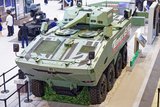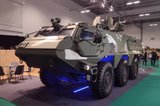KVH announces TACNAV order
KVH has announced that it has received an order from the Office of the Program Manager-Saudi Arabian National Guard to modernise its military vehicles. The $35.6 million contract includes approximately $22 million in equipment and $13 million in services for the Foreign Military Sale (FMS) order.
Under the contract, KVH will supply TACNAV TLS and TACNAV Light navigation systems, and manage the installation, integration, and training services as well as the construction of a retrofit facility.
KVH’s TACNAV military vehicle navigation systems provide unjammable, precision navigation, heading, and pointing data for vehicle drivers, crews, and commanders. Whenever reliable GPS signals are unavailable, TACNAV navigates using dead-reckoning based on its own heading and distance travelled measurements, providing all onboard systems with continuous position calculations to enable them to function correctly while GPS is blocked, jammed, or otherwise degraded.
Deliveries of the TACNAV systems are expected to begin as soon as the third quarter of 2012 and continue into 2013. Installation, integration, and training services will be provided over the period from early 2013 to the second half of 2014.
More from Land Warfare
-
![US DoD task force’s DroneHunter acquisition lays groundwork for Replicator 2 CUAS strategy]()
US DoD task force’s DroneHunter acquisition lays groundwork for Replicator 2 CUAS strategy
As the US Department of Defense looks to counter the growing threat of uncrewed aerial systems to improve homeland security, the DroneHunter acquisition could point to future commercial innovation.
-
![Norway opts for Hanwha’s Chunmoo for long-range fires under $2 billion deal]()
Norway opts for Hanwha’s Chunmoo for long-range fires under $2 billion deal
The selection of Hanwha’s K239 Chunmoo long-range precision fires system, with a contract expected to be signed on 30 January, makes Norway the second European country to choose the system. It is expected an operational system will be in service within four years.
-
![Land forces review: Tanks, trucks and IFVs dominate but woes remain for Ajax]()
Land forces review: Tanks, trucks and IFVs dominate but woes remain for Ajax
This year has begun with main battle tanks taking the lead while orders for large logistics and support vehicles continued from last year. Additionally, two of the British Army’s most significant contracted vehicle programmes, Ajax reconnaissance vehicle and Challenger 3 tank, continued to make news in January.























